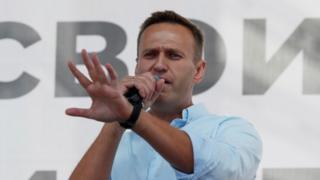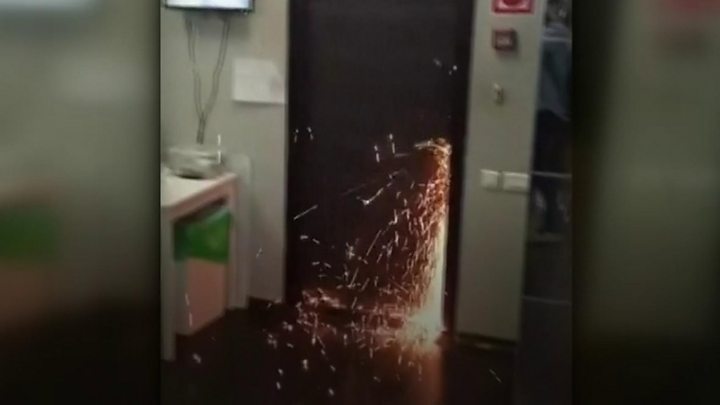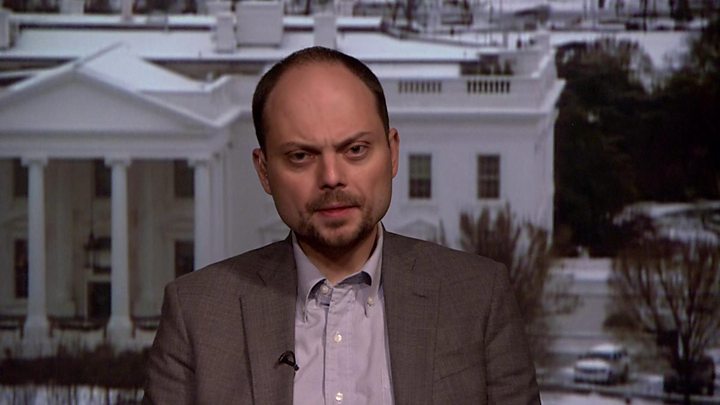 Image copyright
Reuters
Image caption
Mr Navalny was flying to Moscow from Tomsk and was diverted to Omsk after he fell ill
Image copyright
Reuters
Image caption
Mr Navalny was flying to Moscow from Tomsk and was diverted to Omsk after he fell ill
Russian opposition figure Alexei Navalny is unconscious in hospital suffering from suspected poisoning, his spokeswoman has said.
The anti-corruption campaigner fell ill during a flight and the plane made an emergency landing in Omsk, Kira Yarmysh said, adding that they suspected something had been mixed into his tea.
The Kremlin said that it wished Mr Navalny a "speedy recovery".
Mr Navalny, 44, has been a staunch critic of President Vladimir Putin.
In June he described a vote on constitutional reforms as a "coup" and a "violation of the constitution". The reforms allow Mr Putin to serve another two terms in office.
British Foreign Secretary Dominic Raab said he was "deeply concerned" by the reports Mr Navalny had been poisoned, and sent his thoughts to him and his family.
What has the spokeswoman said?
Kira Yarmysh, the press secretary for the Anti-Corruption Foundation, which Mr Navalny founded in 2011, tweeted: "This morning Navalny was returning to Moscow from Tomsk.
"During the flight, he felt ill. The plane made an urgent landing in Omsk. Alexei has toxic poisoning."
She added: "We suspect that Alexei was poisoned by something mixed into [his] tea. It was the only thing he drank since morning.
"Doctors are saying that the toxic agent absorbed faster through the hot liquid. Right now Alexei is unconscious."
Image copyright EPA Image caption Mr Navalny's wife, Yulia Navalnaya, is at the hospital but was initially denied access to her husbandMs Yarmysh later tweeted that Mr Navalny was on a ventilator and in a coma, and that the hospital was now full of police officers.
She also said that doctors were initially ready to share any information but then they later claimed the toxicology tests had been delayed and were "clearly playing for time, and not saying what they know".
She has been told the diagnosis will be "towards evening".
Both Mr Navalny's wife, Yulia Navalnaya, and doctor, Anastasia Vasilyeva, had arrived at the hospital, Ms Yarmysh said.
She said Mrs Navalnaya was initially denied access to her husband because authorities said the patient had not agreed to the visit she but had now been allowed on to the ward. Dr Vasilyeva had not been allowed on to the ward, Ms Yarmysh said.
She said they had been told that all of Mr Navalny's belongings would be confiscated, but Mrs Navalnaya did not allow them to be seized and took them with her.
What are the other reports from the scene?
The Tass news agency quoted one source at the Omsk Emergency Hospital as saying: "Alexei Anatolyevich Navalny, born in 1976. Poisoning intensive care."
However, the deputy head physician of the hospital later told media that it was not certain Mr Navalny had been poisoned, although poisoning was "naturally" one of the diagnoses being considered.
Anatoly Kalinichenko said that doctors were "genuinely trying to save [Mr Navalny's] life".
Kremlin spokesman Dmitry Peskov later said it wished the critic a speedy recovery - as it would all citizens in such circumstances - and that the authorities would consider approving treatment abroad if it were requested.
Responding to the proposal, Dr Vasilyeva said she wanted to transfer him to a leading European poison control centre but doctors in Omsk were refusing to provide documentation about his condition.
Image copyright EPA Image caption A man in Moscow watches social media footage of Mr Navalny being stretchered to an ambulanceVideo footage on social media shows Mr Navalny being taken on a stretcher to an ambulance on the airport runway.
Other disturbing video appears to show a stricken Mr Navalny in pain on the flight.
Passenger Pavel Lebedev said: "At the start of the flight he went to the toilet and didn't come back. He started feeling really sick. They struggled to bring him round and he was screaming in pain."
Another photograph on social media purports to show Mr Navalny drinking from a cup at a Tomsk airport cafe.
The Interfax agency said the cafe owners were checking CCTV to see if it could provide any evidence.
Who is Alexei Navalny?
He made a name for himself by exposing official corruption, labelling Mr Putin's United Russia as "the party of crooks and thieves", and has served several jail terms.

Media playback is unsupported on your device
In 2011 he was arrested and imprisoned for 15 days following protests over vote-rigging by Mr Putin's United Russia party in parliamentary elections.
Mr Navalny was briefly jailed in July 2013 on embezzlement charges but denounced the sentence as political.
He attempted to stand in the 2018 presidential race but was barred because of previous fraud convictions in a case he again said was politically motivated.
Mr Navalny was also given a 30-day jail term in July 2019 after calling for unauthorised protests.
He was taken ill during that jail sentence. Doctors diagnosed him with "contact dermatitis" but he said he had never had any acute allergic reactions and his own doctor suggested he might have been exposed to "some toxic agent". Mr Navalny also said he thought he may have been poisoned.
Mr Navalny also suffered a serious chemical burn to his right eye in 2017 after he was assaulted with antiseptic dye.
Last year his Anti-Corruption Foundation was officially declared a "foreign agent", enabling the authorities to subject it to more checks.
If this is confirmed as a poisoning, previous attacks on high-profile critics of President Putin would again be thrown into the spotlight.
They include politician Boris Nemtsov and journalist Anna Politkovskaya, who were shot dead, and intelligence officer Alexander Litvinenko, who died of poisoning in the UK.
Another journalist, Vladimir Kara-Murza, is still alive but has alleged he was poisoned twice by Russian security services.

Media playback is unsupported on your device

 5 years ago
678
5 years ago
678 

